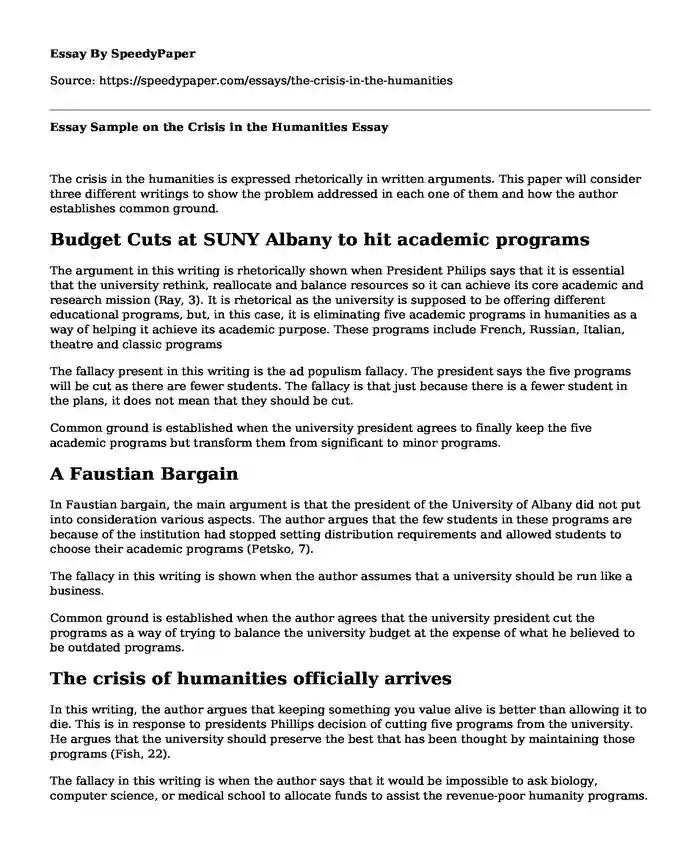
| Type of paper: | Article review |
| Categories: | University Education Linguistics |
| Pages: | 2 |
| Wordcount: | 495 words |
The crisis in the humanities is expressed rhetorically in written arguments. This paper will consider three different writings to show the problem addressed in each one of them and how the author establishes common ground.
Budget Cuts at SUNY Albany to hit academic programs
The argument in this writing is rhetorically shown when President Philips says that it is essential that the university rethink, reallocate and balance resources so it can achieve its core academic and research mission (Ray, 3). It is rhetorical as the university is supposed to be offering different educational programs, but, in this case, it is eliminating five academic programs in humanities as a way of helping it achieve its academic purpose. These programs include French, Russian, Italian, theatre and classic programs
The fallacy present in this writing is the ad populism fallacy. The president says the five programs will be cut as there are fewer students. The fallacy is that just because there is a fewer student in the plans, it does not mean that they should be cut.
Common ground is established when the university president agrees to finally keep the five academic programs but transform them from significant to minor programs.
A Faustian Bargain
In Faustian bargain, the main argument is that the president of the University of Albany did not put into consideration various aspects. The author argues that the few students in these programs are because of the institution had stopped setting distribution requirements and allowed students to choose their academic programs (Petsko, 7).
The fallacy in this writing is shown when the author assumes that a university should be run like a business.
Common ground is established when the author agrees that the university president cut the programs as a way of trying to balance the university budget at the expense of what he believed to be outdated programs.
The crisis of humanities officially arrives
In this writing, the author argues that keeping something you value alive is better than allowing it to die. This is in response to presidents Phillips decision of cutting five programs from the university. He argues that the university should preserve the best that has been thought by maintaining those programs (Fish, 22).
The fallacy in this writing is when the author says that it would be impossible to ask biology, computer science, or medical school to allocate funds to assist the revenue-poor humanity programs.
Common ground is established when the author agrees that based on efficiency and productivity, it makes sense to withdraw finances from those programs as they do not bring in money to the university but draw money from it.
Works Cited
Fish, Stanley. "2010 October 11 - Opinionator - The New York Times". Opinionator.Blogs. Nytimes.Com, 2010, http://opinionator.blogs.nytimes.com/2010/10/11/. Accessed June 12, 2019.
Petsko, Gregory. "Genome Biology." Genome Biology, 2010, http://genomebiology.com/2010/11/10/. Accessed June 12, 2019.
Ray. "Budget Cuts At SUNY Albany To Hit Academic Programs - CBS 6 Albany". Recession in reality.Blogspot. Com, 2010, http://recessionreality.blogspot.com/2010/10/budget-cuts-at-suny-albany-to-hit.html. Accessed June 12, 2019.
Cite this page
Essay Sample on the Crisis in the Humanities. (2023, Jan 20). Retrieved from https://speedypaper.com/essays/the-crisis-in-the-humanities
Request Removal
If you are the original author of this essay and no longer wish to have it published on the SpeedyPaper website, please click below to request its removal:
- Free Essay on English Colonies of the Chesapeake Bay and New England Regions
- Love Relationship Essay Samples for Everyone
- Street Children as Victims or Criminals. Free Essay.
- Free Paper with an Analysis of Santana Concert: Just Feel Better
- How Isolation May Affect the Mental Development of a Human. Essay Sample
- Free Essay: Application for a Graduate Research Executive Position.
- Essay Sample on Religion and Religious Oppression
Popular categories




